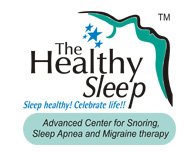Sleep apnea is a life threatening sleep disorder wherein the breathing or airflow becomes very shallow or is briefly interrupted during sleep. Such pauses in breathing typically last for several seconds, sometimes minutes which in turn jolt you out of your natural sleep rhythm. As a result, you tend to spend less time in deep, restorative sleep that is essential to keep you mentally and physically active the next day. Sleep apnea commonly occurs in adults and is rarely seen in children. Although a diagnosis of sleep apnea often can be easily identified based on a person’s medical history, there are various tests that can be conducted to confirm the diagnosis. The treatment of sleep apnea includes both surgical and nonsurgical techniques.
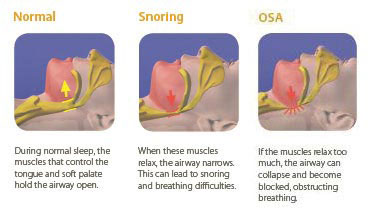
Effects of Sleep Apnea
Chronic deprivation of sleep as a result of sleep apnea causes slow reflexes, daytime sleepiness, low levels of concentration and highly prone to accidents. This condition can also cause serious health conditions later on such as stroke, high blood pressure, diabetes, heart disease and weight gain.
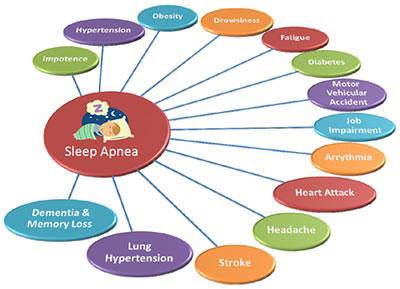
What are the types of sleep apnea?
There are three types of sleep apnea:
- Obstructive sleep apnea (OSA): Obstructive sleep apnea is the most common type of sleep apnea. It occurs when the soft tissue present at the back of the throat relaxes excessively during sleep and prevents adequate flow of air, thereby causing you to snore loudly.
- Central sleep apnea (CSA): Central sleep apnea is a much less common type of sleep apnea that involves the central nervous system. It occurs when the brain fails to send signals to the muscles that control breathing. People with central sleep apnea rarely snore.
- Mixed or complex sleep apnea: This type of sleep apnea includes symptoms of both central sleep apnea and obstructive sleep apnea.
Signs and symptoms of sleep apnea
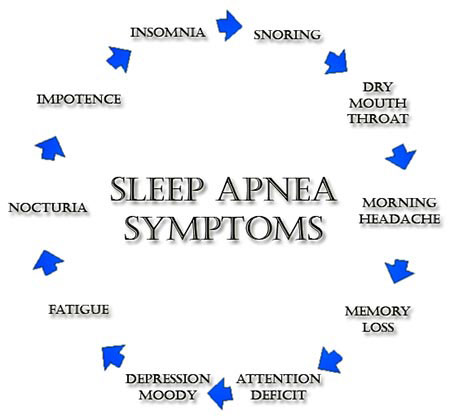
Major symptoms of sleep apnea include:
- Long pauses in breathing
- Loud, chronic snoring
- Choking, snorting, or gasping during sleep
- Morning headaches
- Insomnia or nighttime awakenings
- Moodiness, irritability, or depression
- Waking up feeling out of breath
- Excessive sweating
- Forgetfulness and lack of focus and concentration
- Excessive daytime sleepiness (hypersomnia)
- Waking up with a sore throat or dry mouth
Causes of obstructive sleep apnea
Obstructive sleep apnea is caused when the soft muscles in the back of your throat relax excessively. As a result, your airway narrows or closes as you breathe in, which results in an inadequate supply or intake of air. This reduces the oxygen level in the blood which in turn causes the brain to send signals that rouses you from sleep so that you can breathe properly. Such pauses in breathing can repeat itself for about 100 times or more every single night and prevent you from getting a deep, fitful sleep. Snorting, choking or gasping sounds are also very common and is a chief characteristic of obstructive sleep apnea. People with obstructive sleep apnea may not even be aware that their sleep was interrupted.
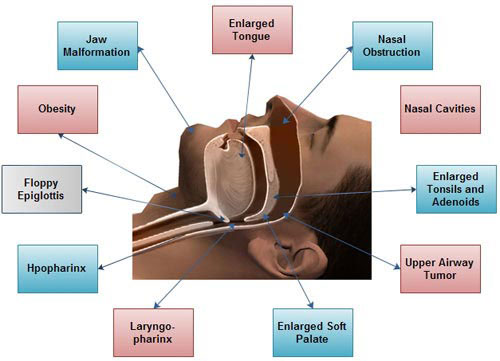
Causes of central sleep apnea
Central sleep apnea, which is much less common, occurs when the brain fails to send signals to the muscles that control breathing. You may wake up at might complaining of shortness of breath or difficulty trying to get sleep. The most common cause of central sleep apnea is heart failure and stroke. Most people with central sleep apnea are more likely to remember awakening than people with obstructive sleep apnea.
Risk factors
You are at an increased risk of obstructive sleep apnea if you are:
- Overweight
- Short thick neck
- Use alcohol, sedatives or tranquilizers
- Smoker
- You have inherited a naturally narrow throat or in cases of enlarged adenoids or tonsils, which can block the airway
- Men are twice more likely to have sleep apnea than women
- You are most likely to have sleep apnea in case you have family members with the same condition
- Over the age of 65









